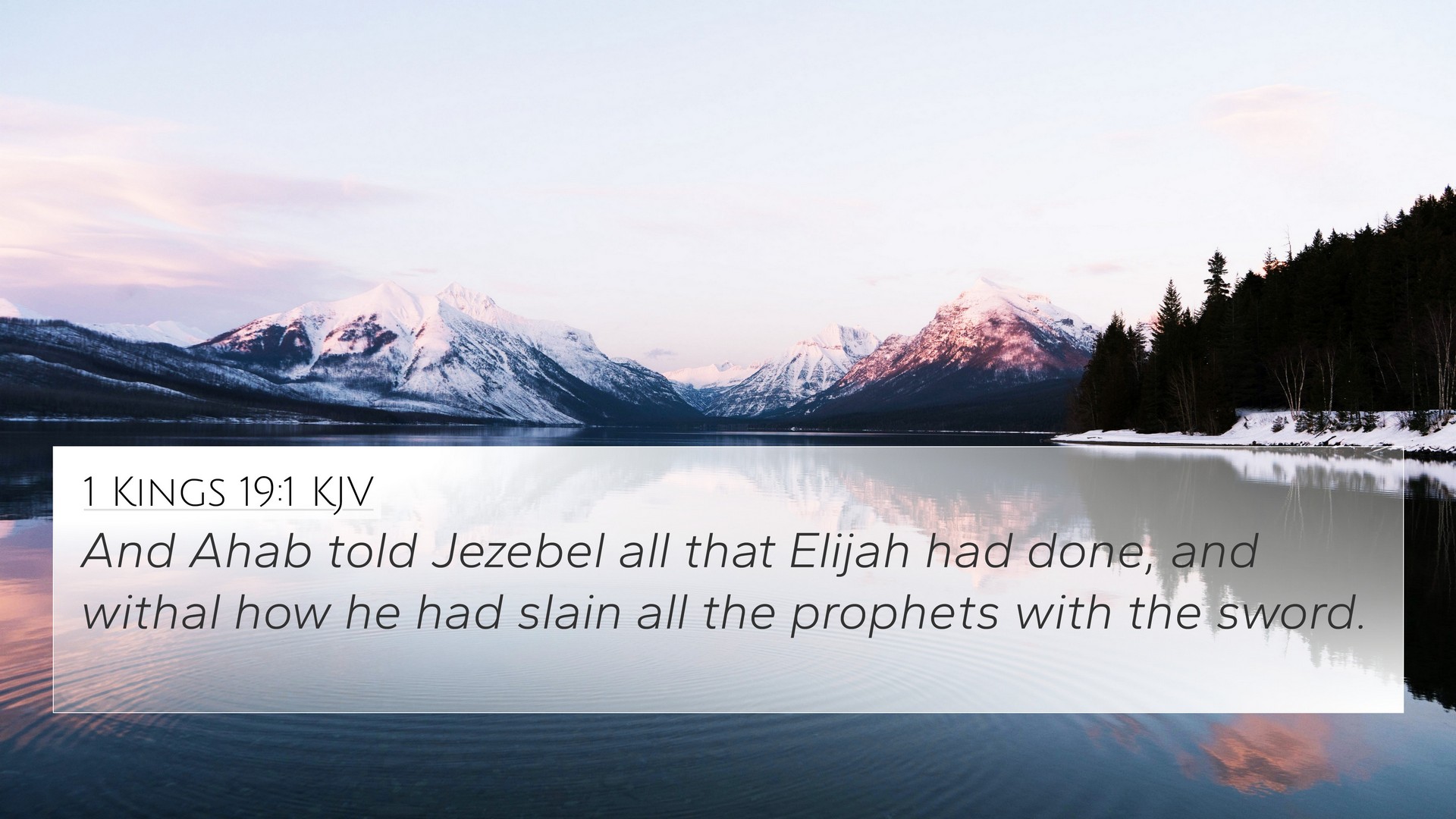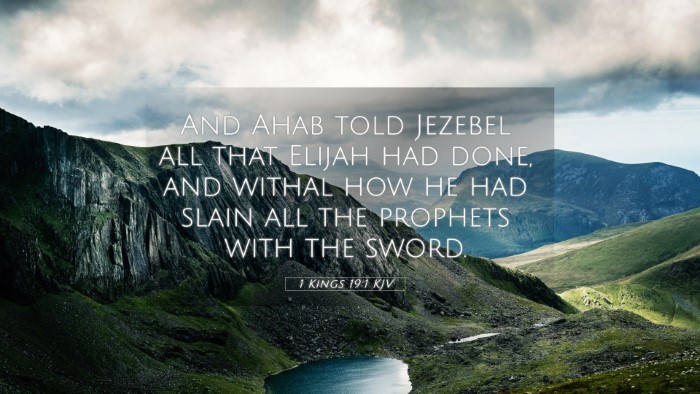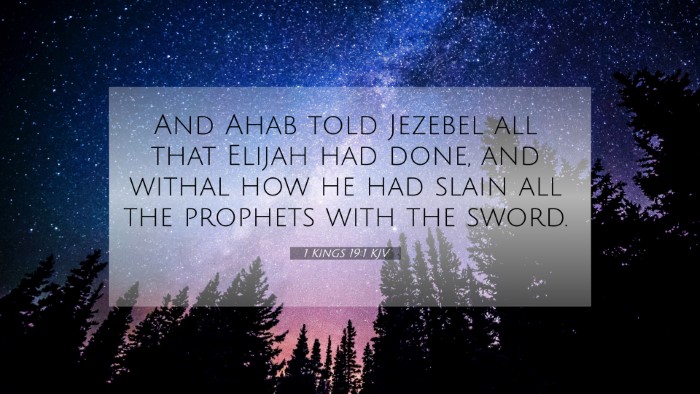Old Testament
Genesis Exodus Leviticus Numbers Deuteronomy Joshua Judges Ruth 1 Samuel 2 Samuel 1 Kings 2 Kings 1 Chronicles 2 Chronicles Ezra Nehemiah Esther Job Psalms Proverbs Ecclesiastes Song of Solomon Isaiah Jeremiah Lamentations Ezekiel Daniel Hosea Joel Amos Obadiah Jonah Micah Nahum Habakkuk Zephaniah Haggai Zechariah Malachi1 Kings 19:1 Similar Verses
1 Kings 19:1 Cross References
And Ahab told Jezebel all that Elijah had done, and withal how he had slain all the prophets with the sword.
Uncover the Rich Themes and Topics of This Bible Verse
Listed below are the Bible themes associated with 1 Kings 19:1. We invite you to explore each theme to gain deeper insights into the Scriptures.
1 Kings 19:1 Cross Reference Verses
This section features a detailed cross-reference designed to enrich your understanding of the Scriptures. Below, you will find carefully selected verses that echo the themes and teachings related to 1 Kings 19:1 KJV. Click on any image to explore detailed analyses of related Bible verses and uncover deeper theological insights.
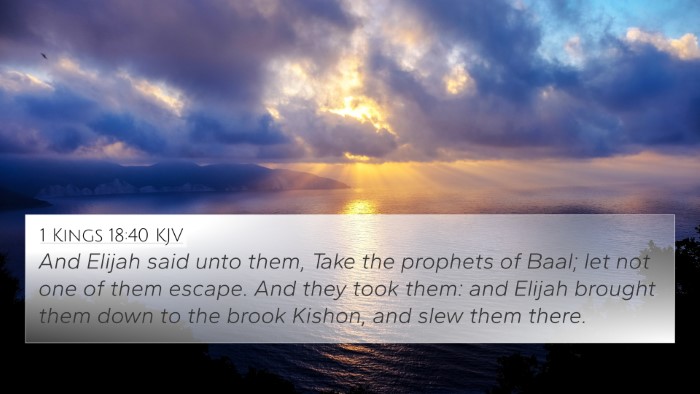
1 Kings 18:40 (KJV) »
And Elijah said unto them, Take the prophets of Baal; let not one of them escape. And they took them: and Elijah brought them down to the brook Kishon, and slew them there.
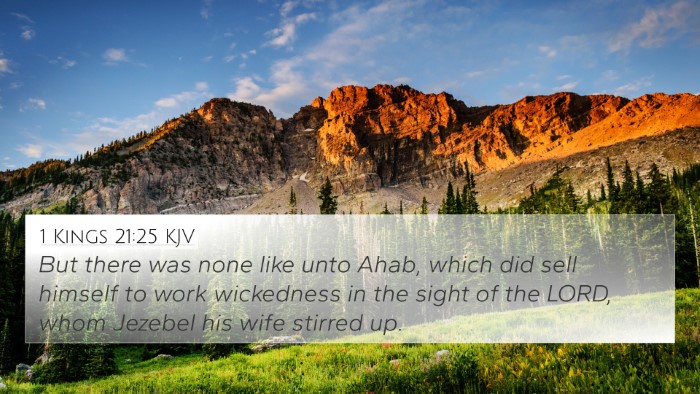
1 Kings 21:25 (KJV) »
But there was none like unto Ahab, which did sell himself to work wickedness in the sight of the LORD, whom Jezebel his wife stirred up.
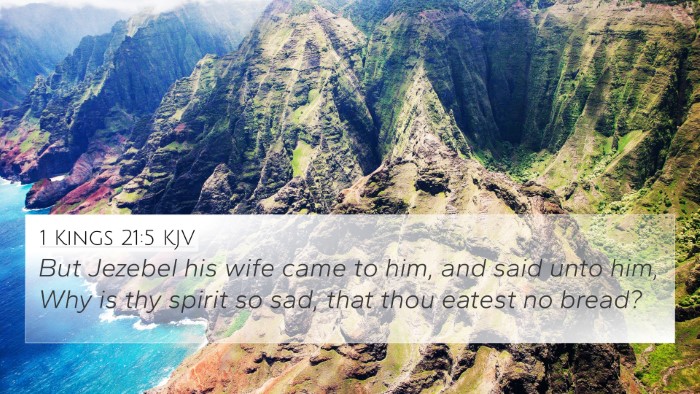
1 Kings 21:5 (KJV) »
But Jezebel his wife came to him, and said unto him, Why is thy spirit so sad, that thou eatest no bread?
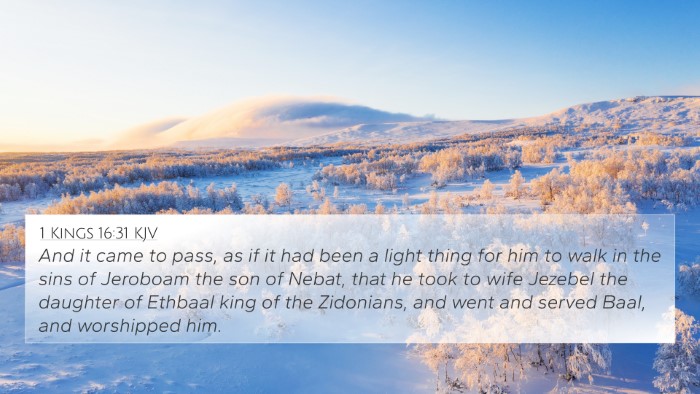
1 Kings 16:31 (KJV) »
And it came to pass, as if it had been a light thing for him to walk in the sins of Jeroboam the son of Nebat, that he took to wife Jezebel the daughter of Ethbaal king of the Zidonians, and went and served Baal, and worshipped him.
1 Kings 19:1 Verse Analysis and Similar Verses
Understanding 1 Kings 19:1
Verse: 1 Kings 19:1 - "And Ahab told Jezebel all that Elijah had done, and withal how he had slain all the prophets with the sword."
Summary of the Verse
This verse takes place after the dramatic defeat of the prophets of Baal by Elijah on Mount Carmel. Ahab, the king of Israel, reports to Jezebel, his wife, the events that transpired, including the execution of the Baal prophets. This situation sets the stage for the ensuing conflict between Elijah and Jezebel.
Commentary Insights
-
Matthew Henry's Commentary:
Matthew Henry emphasizes the contrast between Elijah's triumph over the prophets of Baal and Ahab's cowardice in reporting the news to Jezebel. He indicates that Ahab's report symbolizes the duplicity of leadership and how fear of the wicked can overshadow one’s victory in righteousness.
-
Albert Barnes' Notes:
Barnes focuses on the significance of Jezebel's reaction to Elijah’s actions. He reflects on the character of Jezebel as a manipulator and a fierce opponent of the true God, which serves to highlight Elijah's isolation following his great victory. The fear of Jezebel reveals the psychological aspect of their struggle.
-
Adam Clarke’s Commentary:
Clarke notes the importance of Ahab’s role in this narrative, suggesting that his submission to Jezebel was indicative of his own spiritual weaknesses. He provides a historical perspective on the political climate of Israel, where Ahab is seen as a king whose fear of his wife highlights the tension within the kingdom between idolatry and the worship of Yahweh.
Thematic Bible Verse Connections
1 Kings 19:1 can be linked to several themes and other Bible verses that provide a broader understanding of the spiritual battle Elijah was facing:
- Fear and Courage: Isaiah 41:10 - "Fear thou not; for I am with thee: be not dismayed; for I am thy God: I will strengthen thee; yea, I will help thee."
- Prophetic Authority: Jeremiah 1:8 - "Be not afraid of their faces: for I am with thee to deliver thee, saith the Lord."
- The Nature of Idolatry: Deuteronomy 30:17 - "But if thine heart turn away, so that thou wilt not hear, but shalt be drawn away, and worship other gods, and serve them."
- Conflict of Leadership: John 15:20 - "Remember the word that I said unto you, The servant is not greater than his lord. If they have persecuted me, they will also persecute you."
- Isolation of Prophets: 1 Kings 19:10 - "And he said, I have been very jealous for the Lord God of hosts: for the children of Israel have forsaken thy covenant."
- Spiritual Warfare: Ephesians 6:12 - "For we wrestle not against flesh and blood, but against principalities, against powers, against the rulers of the darkness of this world."
- Divine Protection: Psalm 91:5 - "Thou shalt not be afraid for the terror by night; nor for the arrow that flieth by day."
Cross-Referencing Biblical Texts
This verse is part of a larger narrative about Elijah's life and ministry. Cross-referencing with other passages can provide insights into his fears, his relationship with God, and how leaders are portrayed in the Bible. Here are some cross-references that connect with the themes in 1 Kings 19:1:
- 1 Kings 18:20-40 - The confrontation with the prophets of Baal.
- 1 Kings 19:2 - Jezebel's threat against Elijah, showcasing her resolve.
- 1 Kings 17:1 - Elijah as a prophet declaring judgment against Israel for idolatry.
- 2 Kings 1:9-15 - Further narratives involving Elijah's encounters with royal authority.
- Luke 4:25-26 - Jesus references Elijah in a discussion about prophets being rejected.
- Romans 11:3-4 - References to the remnant chosen by grace, echoing Elijah's experiences.
Interpretive Themes in 1 Kings 19:1
1 Kings 19:1 reflects several key themes found throughout the Bible:
-
Divine Sovereignty:
The verse highlights that despite Elijah's triumph, earthly powers were still in conflict with God's purposes. Ahab and Jezebel represent human opposition to divine will.
-
Resistance to God:
Jezebel’s actions reflect a broader theme of resistance against God, which permeates scripture, illustrating how evil often retaliates against righteousness.
-
The Burden of Prophetic Ministry:
Elijah’s story emphasizes the loneliness and fear that can accompany a true prophetic call, aligning him with other prophets who faced similar challenges, such as Jeremiah.
Practical Applications for Readers
Through the story of Elijah and the implications of this verse, readers can derive several practical applications:
- Courage in Faith: Despite trials and the fear of opposition, believers are called to stand firm in their faith, drawing strength from God’s promises.
- Understanding Spiritual Warfare: Recognizing that spiritual conflicts may manifest in various ways in daily life and engaging in prayer and discernment.
- Leadership Accountability: The reluctance of leadership to confront evil can serve as a warning to maintain integrity and faithfulness in positions of authority.
Conclusion
The complexity of 1 Kings 19:1 reveals significant truths about faith, fear, and the dueling forces of good and evil. The insights drawn from established commentaries highlight the need for believers to be courageous and steadfast, drawing parallels between their lives and those of Biblical figures like Elijah. Understanding these nuances through cross-references enriches the study of scripture, fostering deeper spiritual development.
